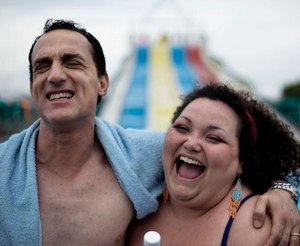Reality TV Hits the Cannes Red Carpet

Reality TV is getting the Cannes treatment at the world's premiere film festival. Italian director Matteo Garrone (pictured above right with actor Nando Paone) brought Reality to the fest's competition, following up his critically acclaimed gangster pic Gomorrah several years ago. The film centers on a village fisherman who sacrifices everything for the perceived chance to become a reality-television celebrity.
After being persuaded to apply for the Italian version of Big Brother, Luciano gets a follow up interview in Rome. He is initially reluctant to pursue the role, but after an interview he thinks went well, Luciano begins to believe he's in the running for the series. After returning to Naples, he begins to believe he's still "being cast" as he goes about his daily life. Soon, he lives as if he's already on the show. A chance meeting with people from Rome turns into an "incognito casting session," and soon it gets worse as he loses sense of actual reality.
"After Gomorrah, I was waiting for a theme that would be as powerful," Garrone said in Cannes on Friday morning. "I wanted a surprising film, but after Gomorrah, I didn't realize I'd be hitting a brick wall."
The film is chock full of thematic takeaways, including the religious metaphor that through good works, one can achieve paradise: In the film, Luciano begins to give up his worldly possessions, believing the people secretly watching him will be charmed by his selflessness — much to the horror of his family. Reality could also be an indictment of the meteoric rise of reality television itself over the past decade, though Garrone said the film takes a neutral stance — at least officially.
 "We shot the film without trying to be critical in any way," he said. "The main character is like a modern day Pinocchio. One can always re-invent this story. We were thinking of Pinocchio as we were making this film... People can read into this story what they like." Still, Garrone alludes to some vague overriding associations. "In Rome he finds some kind of redemption," he noted.
"We shot the film without trying to be critical in any way," he said. "The main character is like a modern day Pinocchio. One can always re-invent this story. We were thinking of Pinocchio as we were making this film... People can read into this story what they like." Still, Garrone alludes to some vague overriding associations. "In Rome he finds some kind of redemption," he noted.
The cult of fame topic is not new to modern Italian cinema. Back in 2009, Erik Gandini brought his documentary Videocracy to the Toronto International Film Festival. The film explores how celebrity worship and the quest for television stardom has threatened Italian democracy itself, turning the country into a culture of banality. Garrone's Reality does not overtly condemn society on that level, but there is enough wiggle room to formulate conclusions.
"We wanted to simply tell a tale that's close to the people," Garrone said. "We weren't trying to critique politics or society. We follow this character and then he loses his inner identity and goes mad."
Read more of Movieline's Cannes 2012 coverage here.
